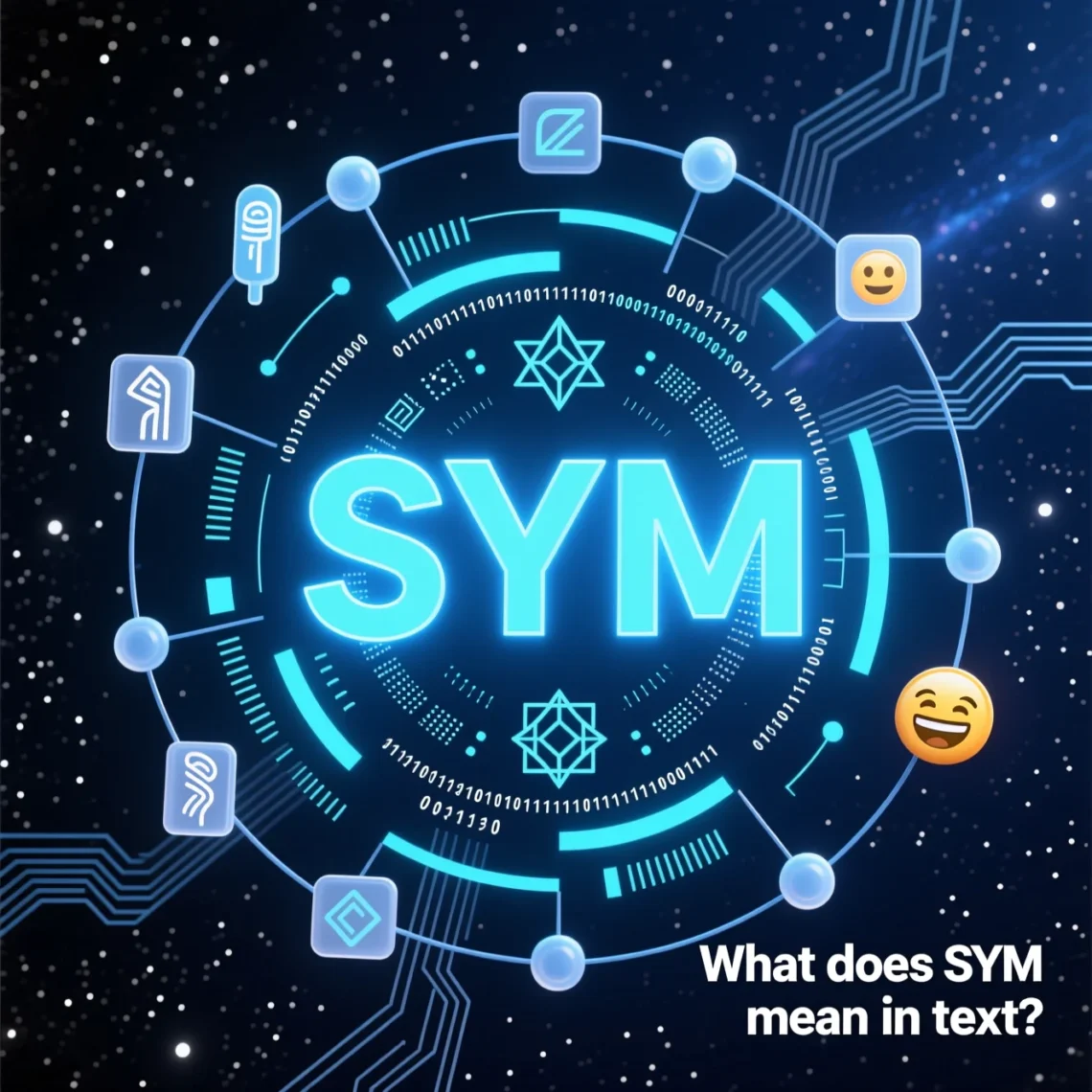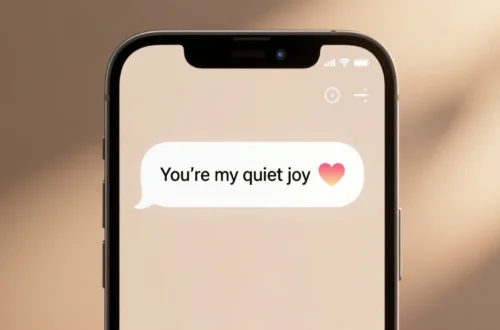Ever come across SYM in a text and wondered what it means? 🤔 This short acronym pops up in chats, social media, and even gaming, carrying a simple yet meaningful message. Whether it’s a friend checking in or a gamer sharing a vibe, SYM is a quick way to connect.
Knowing its meaning helps you stay in the loop, avoid confusion, and reply with confidence. From casual texts to online communities, SYM adds warmth to conversations. In this guide, we’ll unpack what SYM stands for, its history, and how to use it like a pro. Let’s dive in and decode SYM! 🚀
Definition & Meaning
SYM typically stands for “Sending You My” in texting, often followed by words like “love,” “support,” or “thoughts.” It’s a heartfelt way to express care or empathy.
Key Points:
- Sending You My is used to show support, affection, or encouragement, often in emotional or tough moments.
- It’s common in personal chats and social media to convey kindness.
Examples:
- Friend 1: “I’m feeling down about my exam results. 😔”
- Friend 2: “SYM love, you’ll bounce back! 💖”
- Fan 1: “Tough day, need some positivity. 😥”
- Fan 2: “SYM good vibes! You got this! 🌟”
SYM is all about context—expect it in supportive or caring conversations!
Background & History
SYM (Sending You My) is a modern texting acronym rooted in digital communication:
- Origin: It emerged in the early 2000s with the rise of texting and social media, as people sought quick ways to express emotions. It’s a shorthand for phrases like “sending you my love” or “sending you my thoughts,” inspired by heartfelt messages in cards or letters.
- Evolution: SYM gained traction on platforms like Twitter and Instagram, where short, emotional messages thrive. It’s now a staple in supportive online communities.
Key Points:
- SYM grew with the texting boom in the 2000s 📱.
- It’s widely used in English-speaking online spaces to show care or solidarity.
- Unlike older acronyms, SYM is tied to emotional expression rather than technical terms.
Usage in Various Contexts
SYM shines in different settings, often carrying a warm, supportive tone:
- Texting 📲:
- Used to send love, support, or encouragement.
- Example:
- Friend: “I’m nervous about my interview tomorrow. 😬”
- You: “SYM confidence! You’ll do great! 💪”
- Social Media 🐦:
- Common in posts or comments to show empathy or support.
- Example:
- Post: “Going through a tough time. 😔 #NeedSupport”
- Reply: “SYM love and strength! You’re not alone. 💕”
- Gaming 🎮:
- Less common but used to cheer teammates or friends.
- Example:
- Gamer 1: “Lost the match, feeling rough. 😞”
- Gamer 2: “SYM good vibes, we’ll win next time! ⚡”
- Casual Conversations 🗣️:
- Used to express care in person-to-person chats.
- Example:
- Friend: “My dog’s sick, I’m worried. 🐶”
- You: “SYM thoughts, hope they’re okay! 🙏”
Key Point: SYM is perfect for moments needing kindness or support. 💖
Common Misconceptions & Clarifications
SYM is straightforward but can cause confusion:
- Misconception: SYM is a technical or gaming term.
- Clarification: It’s emotional, meaning “Sending You My,” not related to tech or games.
- Misconception: SYM is widely known.
- Clarification: It’s niche, mostly used in English-speaking texting or online communities.
- Misconception: SYM fits all contexts.
- Clarification: It’s informal and best for personal, supportive chats, not formal settings.
Key Point: Use SYM in emotional or caring moments to avoid misinterpretation. 😊 For example, texting “SYM” in a work chat might confuse colleagues expecting a technical term.
Similar Terms & Alternatives
Here are alternatives to SYM for similar sentiments:
- Thinking of You
- Sending Love
- Hugs
- All the Best
Comparison Table:
| Term | Meaning | Best Used In |
|---|---|---|
| SYM (Sending You My) | Expressing care or support | Texting, social media |
| Thinking of You | Similar to SYM, more formal | Cards, personal messages |
| Sending Love | Same as SYM, more explicit | Casual, emotional chats |
| Hugs | Warm, affectionate gesture | Close friendships, family |
Key Point: Choose alternatives like “Thinking of You” for formal or broader contexts to ensure clarity. ✅
How to Respond to This Term
Your response to SYM depends on the mood:
- Casual 😊:
- Example:
- Friend: “SYM love, you got this! 💖”
- You: “Thanks, that means a lot! 😄”
- Example:
- Humorous 😂:
- Example:
- Friend: “SYM good vibes for your big day! 🌟”
- You: “Appreciate it, send more vibes! 😜”
- Example:
- Professional 💼:
- Example:
- Colleague: “SYM support for your presentation.”
- You: “Thank you, I appreciate the encouragement.”
- Example:
- Neutral 🔒:
- Example:
- Friend: “SYM thoughts, hope you’re okay. 🙏”
- You: “Thanks for checking in! 😊”
- Example:
Key Point: Match the tone and show gratitude to keep the conversation warm. 🧡
Regional or Cultural Differences
SYM is mostly used in English-speaking regions:
- Western Countries 🌎: Common in the U.S., U.K., and Australia for supportive texts or posts, especially among younger users.
- Asia 🇯🇵: Less common, as local slang or emojis (like hearts) are preferred for emotional messages.
- Other Regions 🌍: Understood in English-speaking online communities but rare in non-English contexts.
Key Point: SYM is niche to English texting culture; in other regions, similar sentiments use local phrases or emojis. 🌐
Comparison with Similar Terms
Here’s how SYM compares to related expressions:
| Term | Meaning | Key Difference |
|---|---|---|
| SYM (Sending You My) | Expressing care or support | Short, texting-specific |
| Thinking of You | Similar to SYM | More formal, used in cards or letters |
| Sending Love | Same as SYM | More explicit, slightly longer |
| All the Best | Wishing success or support | Broader, less emotional |
Key Point: SYM stands out for its brevity and emotional warmth in digital chats. ✨
Usage in Online Communities & Dating Apps
SYM is used in supportive online spaces:
- Twitter/X 🐦: Appears in comments or posts to show empathy.
- Example:
- Post: “Rough week, need some positivity. 😔 #Life”
- Reply: “SYM love, you’re strong! 💪”
- Example:
- Dating Apps 💘: Used to show care or interest in a kind way.
- Example:
- Bio: “Here for good chats and SYM vibes 😊.”
- Message: “SYM support for your big day! How’s it going? 🌟”
- Example:
- Gaming Communities 🎮: Rare but used to cheer teammates.
- Example:
- Discord: “Lost the game, feeling low. 😞”
- Reply: “SYM good vibes, we’ll get ‘em next time! ⚡”
- Example:
Tips:
- On dating apps, reply to SYM with gratitude to build connection.
- In gaming, use SYM sparingly, as it’s less common than gaming slang. 🚀
Hidden or Offensive Meanings
SYM is generally safe:
- No Offensive Meanings ✅: Sending You My is positive and supportive.
- Potential Issue: In rare cases, it might be misread as a technical acronym in professional or niche contexts.
- Context Matters: Avoid SYM in formal settings to prevent confusion.
Key Point: Stick to SYM in personal, emotional chats to keep it clear and kind. 😊
Suitability for Professional Communication
SYM is not suited for formal settings:
- Sending You My 📝: Too informal and emotional for emails or reports.
- It may confuse colleagues expecting technical or neutral terms.
Alternatives:
- Instead of “SYM support,” say “I’m here to support you” or “best wishes.”
- Instead of “SYM thoughts,” use “thinking of you” in professional contexts.
Key Point: Use formal, clear language in work settings to avoid misunderstandings. 💼
FAQs
- What does SYM mean in texting? 🤔
- It stands for “Sending You My,” used to express love, support, or thoughts.
- How do I know when SYM is used? 🧐
- It’s common in emotional or supportive chats, like when someone’s struggling.
- Is SYM okay for work emails? 📧
- No, it’s too casual. Use “best wishes” or “thinking of you” instead.
- Can SYM be offensive? 😳
- No, it’s positive, but it might confuse people in formal settings.
- How should I reply to SYM? 💬
- Try casual (“Thanks!”), humorous (“Send more vibes!”), or professional (“I appreciate that”).
- Is SYM used differently globally? 🌍
- It’s mainly in English-speaking regions; other cultures use local phrases or emojis.
- Is SYM common on dating apps? 💕
- Yes, to show care. Reply with thanks to keep the chat friendly.
Conclusion
SYM is a warm acronym meaning Sending You My, perfect for sharing love, support, or encouragement in texts and online chats. Whether comforting a friend or cheering someone online, it’s a quick way to show you care. This guide covered SYM’s meaning, history, and usage across texting, social media, and gaming. We also shared tips to respond smoothly and avoid confusion. With SYM, you can spread positivity effortlessly. Next time you see SYM, you’ll know it’s all about kindness and connection! 🌟💖






